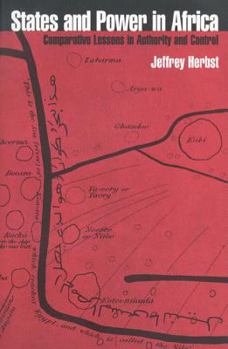States and Power in Africa: Comparative Lessons in Authority and Control
Select Format
Select Condition 
Book Overview
Theories of international relations, assumed to be universally applicable, have failed to explain the creation of states in Africa. There, the interaction of power and space is dramatically different... This description may be from another edition of this product.
Format:Paperback
Language:English
ISBN:0691010285
ISBN13:9780691010281
Release Date:March 2000
Publisher:Princeton University Press
Length:296 Pages
Weight:0.95 lbs.
Dimensions:0.7" x 6.0" x 9.3"
Customer Reviews
4 ratings
A Welcome Respite from Conventional IR Theory
Published by Thriftbooks.com User , 15 years ago
The book is well-researched and compelling, presenting a myriad of interlinking causal factors that makes the European-style nation-state unworkable in Africa. For example: the placement of colonial centers (today's capitol cities) to favor expediency in commerce over effectiveness in ruling; the existence of a multitude of distinct national (tribal) identities, many with pre-existing governance systems; people's propensity to ally with these national identities rather than with the nation-state; the population's mobility and the willingness of individuals to shift their allegiance to neighboring groups (resulting in the practical irrelevance of state borders); the lack of a shared history between the populace and the elites that could result in a contract of mutual obligation (in Europe this was worked out over the centuries because of security concerns); the colonial preference for one-crop economies, the complexity of language politics in Africa, and much more. All this leads to conclusion that the cost-benefit ratio of extending rule effectively outward from the capitol is just not worth it. Of course, that's an oversimplification, there's a lot more here. In all the pool of evidence is deep and wide. One criticism is that some think the model is not applicable elsewhere - well, it is (I'm currently working in the Philippines). But really, I don't care if it isn't. Political science has for too long been hamstrung by the search for universal, one-size-fits-all models. The world doesn't work that way, and this book is a step toward helping the discipline grow up.
States Make Wars, Wars Make States
Published by Thriftbooks.com User , 18 years ago
The scholarly literature on state creation and consolidation usually fails to account for the African experience. The central idea of this literature is that the high population density of Europe made land relatively scarce and valuable to control, particularly from the late Middle Ages onward. This and technological change in the methods of warfare (e.g., more sophisticated battle tactics and firearms) drew states into continual conflict. But warfare is costly, and early modern states required resources to attack and defend. To get money for wars, kings had to build bureaucracies, gather information, and map their territory and people. They also had to make concessions- such as creating regular parliaments where citizens could have a voice. All these things were necessary to survive. If a state did not become "stronger", then typically it became extinct. This process created the modern system of nation states with their familiar institutional infrastructures that consolidated in Europe in the nineteenth century. Herbst's argument is that this process has not taken place in Africa. It did not take place historically in the precolonial era, it did not take place during the colonial epoch, and it is not taking place since or now. Why? Africa is different because the structural conditions that led to the path of state formation and institution building in Europe were absent in Africa. Unlike in Europe, land was and is not scarce in Africa. Rather, labor was scarce. Thus in the precolonial period, states did not fight over land, but rather people. This meant that precolonial states had vague borders and were often very "weak". Without the constant necessity of defending a well-defined territory, states did not need to invest in bureaucracies, censuses of their populations, tax collectors, or permanent militaries. This absence of external threats coupled with low population densities persisted. During the colonial period there was little fighting over borders between the colonial powers. The conference of Berlin in 1885 largely determined which European power would have which bit of Africa. This meant that, like the precolonial polities, European colonial powers had little incentive to develop state institutions. Instead they focused on commercial exploitation and outright plunder of the mineral and natural wealth. Following independence, the situation could have changed but did not, because the international state system and the United Nations decided to enforce the colonial boundaries that had largely determined the form that the new nations took. This trend was reinforced by Cold War politics. Thus African states were still able to survive without having to engage in the type of institution building that occurred historically in Europe. Herbst argues that the lack of development of African state institutions helps explain many aspects of modern Africa. Since states never had to fight to survive they never had to build effective fiscal insti
Realism for Africa
Published by Thriftbooks.com User , 18 years ago
Smart and insightful - a realistic look at the causes of many of Africa's problems today, without the usual shallow laying of blame on colonialism or traditional African society. Beyond that, it makes one take a critical look at state formation and the limitations and assumptions that go with it, coming as a welcome respite from the European models of state formation that are too often foisted on the rest of the world. Others outline the content well, so I won't bother. Just to say I highly recommend it. A book of practical realities.
Provocative Explanation of Many of Africa's Problems
Published by Thriftbooks.com User , 22 years ago
Interesting explanation for the weakness of the African state. The importance of this work is illuminated when one realizes that weak states are not only primary causes of many of Africa's ills but direct results as well. Herbst really gives one food for thought.




